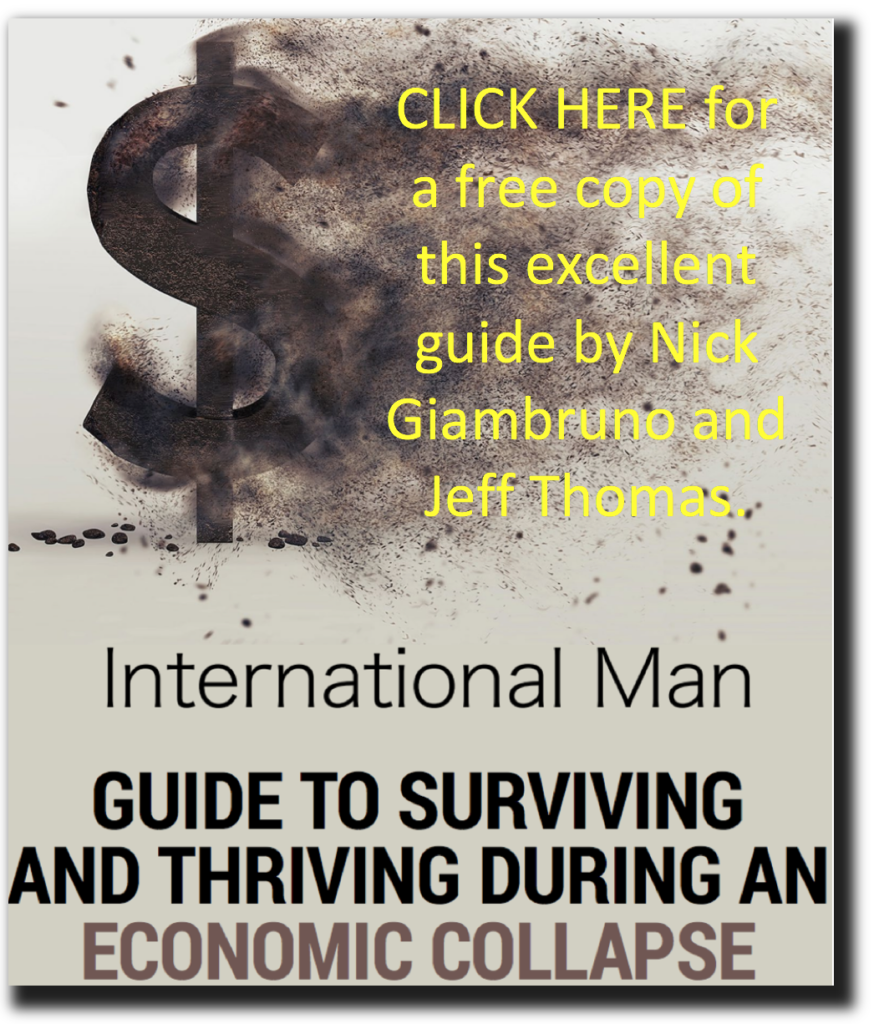Doug Casey’s REAL State of the Union – The 5th Amendment, Part II
by Doug Casey

Joel: G’day Doug. Last you and I spoke we were discussing nothing less than the Rule of Law, what many consider to be the very cornerstone of Anglo-American law and justice.
Doug: The Due Process clause of the 5th Amendment. One of the few concepts in law that actually helps keep the wolves in government from our throats. When it’s observed, anyway.
Joel: Exactly. Of course, there are two other very important sections of that oft-abused amendment, the Criminal Procedures Clause and the Takings Clause. Shall we go through these today?
Doug: No time like the present.
Joel: To begin with the Criminal Procedures Clause – which basically covers the Grand Jury, Double Jeopardy and Self-Incrimination sections of the amendment – there’s been quite an erosion of individual rights over the years.
Do you want to start with the Grand Jury idea?
Doug: Sure. The idea of the Grand Jury is actually very old, with origins dating back to the Magna Carta. It basically began as a tool of the Crown, compelling unpaid citizens to enforce the King’s Law.
Over time, however, they came to be seen as an important check against tyrannical power. By the time the American Founders were framing their constitution, this was the common perception on both sides of the pond – that Grand Juries would act as a kind of bulwark of freedom against overzealous governments and their prosecutorial impulses.
Of course, as with most things in the Bill of Rights, this concept too has become degraded. Although the US is the only country in the world that still uses Grand Juries – mostly at the federal level, but also in about half the states – the Supreme Court long ago decided that they weren’t a necessary component of Due Process, despite it being explicitly outlined in the 5th Amendment. In fact, the Supreme Court has ruled that federal Grand Juries need not even adhere to trial rules of evidence, or be told of evidence exculpating the defendant. It’s actually not rational. If a jury is intelligent enough to be empanelled, they should be intelligent enough to view all the relevant facts. Not just the ones the government’s prosecutors select.
Because prosecutors essentially control what information a courtroom hears, a Grand Jury can be led to, in the words of one former Chief Judge of the New York Court of Appeals, “indict a ham sandwich.”
So yes, the system has predictably deteriorated. What was once seen as a safeguard against governmental overreach has, over time, been interpreted out of relevance. Grand juries are largely tools of the state that give a patina of justice to the charade of prosecutors building their reputations.
Joel: The same can be said for much of the rest of that Criminal Procedures Clause, I guess? What about the idea of protection against self-incrimination, something most people recognize from Cop & Court shows as “pleading the 5th”?
Doug: There are ways around everything, especially if – as is the case with the government – you write your own rules. If the State wants a witness to testify – say it claims to have bigger fish to fry in the relevant case – it can grant “immunity” to the witness in question and actually compel him, under pain of contempt of court, to testify.
But it’s interesting that most people only know what they do of the law thanks to, as you say, Cop & Court shows like Law & Order, CSI, and the like. Almost nobody bothers to actually read the Constitution or the Bill of Rights themselves anymore. It’s a bit the way it was growing up as a Roman Catholic, in regard to reading the Bible. We were discouraged from doing so, because we might have gotten some ideas that differed from the Church’s interpretation.
It’s interesting—as we’re finding—to actually read the Bill of Rights. But as a practical matter, it doesn’t mean what it says. It means what some men on some court says it means. That’s a pity, because these are actually pretty sound documents, as far as they go.
Joel: Coincidentally, another example of “the 5th” that people see on television and in the movies has to do with their so-called “Miranda Rights,” which comes from a famous case back in the 60s, Miranda v. Arizona.
Doug: Yes, it’s why T.V. cops go through the whole “You have the right to remain silent, anything you say can and will be used against you in a court of law…” rigmarole when they apprehend suspects.
It was originally intended to protect a suspect from what’s known as the “informal compulsion” considered “inherent” in custodial interrogation. For obvious reasons, confessions obtained under compulsion aren’t particularly reliable, and certainly there were plenty of cases where police would decide what they wanted to hear, then simply beat a suspect until they got the desired answers.
But views change. In Classical times, the testimony of a slave—which wasn’t considered to be worth much anyway—had no value at all unless it was made under torture.
Miranda was supposed to protect against all that.
Joel: I feel a “however” coming…
Doug: Since the mid 70s, there have been a number of Supreme Court rulings that basically defang so-called “Miranda Rights,” especially on grounds of alleged “public safety” and in matters related to deportation proceedings.
So no, the law is no longer interpreted to protect you as much as it is to provide various tools for the State to prosecute you, if it so wishes.
 One thing that I’ve learned from talking to attorneys, however, is that you want to keep your interactions with the police to an absolute minimum. Be polite, but limit your responses. If you suspect the officer is on a witch hunt, ask for an attorney. Nothing you say will inure to your benefit. And it’s impossible to predict how what you do say could be used against you. You’re dealing with professionals that have an agenda. If you “play ball” with them it’s likely to end up about as well as if you play ball with some NFL linemen.
One thing that I’ve learned from talking to attorneys, however, is that you want to keep your interactions with the police to an absolute minimum. Be polite, but limit your responses. If you suspect the officer is on a witch hunt, ask for an attorney. Nothing you say will inure to your benefit. And it’s impossible to predict how what you do say could be used against you. You’re dealing with professionals that have an agenda. If you “play ball” with them it’s likely to end up about as well as if you play ball with some NFL linemen.
Joel: I guess that brings us to the Takings Clause...
Doug: Which, apparently, the government reads as it being able to take from you whatever it wants.
Joel: Right. The actual wording, “[n]or shall private property be taken for public use, without just compensation,” seems conveniently open to creative interpretation.
Who, for example, decides what constitutes “just compensation”?
Doug: The State does, of course. And this furnishes us with an excellent example of how the State chooses to observe the parts of the law it finds convenient, and only those parts.
Let’s get down to what we’re really talking about here. As far as I know, the courts have never read the Takings Clause to apply to taxes. By why shouldn’t it apply in that context?
If they're taking 50% or 20% or even 1% of your income, how is that any different than taking a piece of your property without compensation? They're not giving you anything in return for it… well, they say they are, but maybe it's nothing that you want. I would prefer to pay for roads, garbage collection, police, or any of the other things the government claims to do for me… but usually poorly and in a costly manner.
Of course, you have no choice in the matter. And that, to my mind, precludes any such arrangement from being called “just.”
Joel: The idea of a 1% tax always grated on me. It’s not a 1% tax. It’s a 99% refund… as determined by the only party to the arrangement that brought a gun to the table. Effectively, you “own” only what the state decides to “let you” own…which, since the arrangement is not voluntary, as you point out, can just as easily mean nothing.
Ultimately, if you’re not in possession of your self and – by extension – the fruits of your labor – for which you exchange your finite time, essentially your life – then you’re not really in possession of anything.
The life the state “permits” you have is really just a refund. It’s a left over.
Doug: Yes, self-ownership and individual sovereignty are fundamental matters of principle, and once you roll over on the basic principle, the game is over, quite frankly. That’s why the Republicans are such an embarrassment. They accept all the principles of the left. They just say the left is going too far, or too fast. That’s why they’re viewed—correctly, in my view—as hypocrites and sellouts.
Joel: Whether it’s Republicans or Democrats, whenever the state enters the market – be it in road construction or garbage collection or education – it necessarily crowds out private actors. Since the State effectively subsidizes its own activities through appropriated funds – something private businesses cannot legally do – it has an unfair advantage.
Accordingly, it has little incentive to actually provide a decent good or service, since it has no competition in that bracket of the market. And since the state typically occupies the “bottom end” of the market, the so-called “safety net” end, it’s those at the lower end of the economic spectrum who are forced to suffer the kind of substandard services that a paucity of competition always guarantees.
It’s not the rich people who are affected by terrible public schools and filthy public hospital rooms. They couldn’t care less. It’s the poorest who shoulder the burden of self-congratulatory attempts to “rescue them” from private market competition.
Doug: Exactly right. The unintended consequences of the busybody brigade are too numerous to count. Maybe we’re getting a bit off topic, but it’s an opportunity to mention that the State’s interference with the economy is basically due to the “general welfare” clause—just two words—in the main body of the Constitution. You give these people an inch, and they take a mile.
Joel: So what about the idea of eminent domain, then, when the government actually does come in and “forcibly acquires” your house to build a gladiatorial arena, or whatever else it is they decide the public desperately needs?
Doug: Like everything else in the Bill of Rights, this Takings Clause has been debased. It used to be that the government only exercised eminent domain for an expressly public good. Perhaps building a highway through somebody's land. Most people were actually anxious to have that happen, because not only would they be compensated for the land that was taken, but the rest of their land would go up in value, because it was now accessible.
I have reservations about even that kind of “taking”. But it used to work within certain bounds and limits. Now, however, it's scandalously abused. Developers that want to build a casino, or a stadium, or whatever, have the local government exercise eminent domain for their benefit. It’s rationalized by saying, "Well, we get the tax revenues. It'll upgrade the city". In fact, it not only abrogates the rights of the generally poor property holders, but opens the door to massive payoffs and corruption.
That wasn't the original idea.
Joel: Well, the 5th certainly is a complex Amendment, and we could probably spend weeks dissecting it, but let’s get down to brass tacks.
How do you rate both the U.S. government in its basic observance of the Amendment? And what about the citizens it claims ownership of, how do you think they value and/or live up to the rights enumerated therein?
Doug: The government gets a “B” for form and pretense. And a “D” for the reality. The public gets a “D” as well. They wouldn’t even know the 5th exists if it wasn’t for TV dramas.
Joel: Thanks, as always, for taking the time, Doug. Next time, we’ll get to the 6th… the “speedy trial” clause.
Doug: That will be a good opportunity to talk about the court system itself. Which is somewhere between an abomination and a lottery.
Editor's note: Clearly, there are many strange things afoot in the world. Distortions of markets, distortions of culture. It’s wise to wonder what’s going to happen, and to take advantage of growth while also being prepared for crisis. How will you protect yourself in the next crisis? See our PDF guide that will show you exactly how. Click here to download it now.
Tags:






